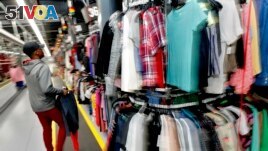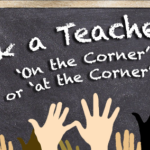11 July 2021
Americans are letting go of their old clothes as COVID-19 vaccinations continue, restrictions are eased and offices are reopening. The clothes are going to online resale sites as well as donation centers.
The used-clothes marketplace ThredUP paid the research company GlobalData to find information on the movement in used clothing. Projections by GlobalData show the business is expected to double from $36 billion to $77 billion in 2025.
James Reinhart leads ThredUP. He said the growth is driven by new sellers putting high quality clothes into the market. He estimates that Americans collectively have at least $9 billion worth of products they do not wear.

Willie Walton hangs clothing on a three-level system at the ThredUp sorting center in Phoenix on March 12, 2019. Many Americans are dry cleaning their clothes again as they go back to work after being vaccinated. (AP Photo/Matt York, File)
Buying and selling used clothes was popular before COVID. However, since the pandemic, the movement for buying and selling used clothes has strengthened.
Reinhart said shoppers think more about the environment now. He said an increasing number of them seek products that have a good resale value instead of low-cost, low-quality clothes, known as fast fashion.
Reinhart said, the change demonstrates a new beliefs set among the clothes-buying public.
"It's not this buy, wear, throw out," he said, adding that people are much more sensitive to the idea of waste.
TheRealReal is a luxury resale site with more than 22 million members. A company report says that the total value of used goods sold this year through May was about $239 million. The report said that number represents a 53 percent increase from the same period in 2019.
Jessica Richards studies and predicts movements in the fashion industry for the Accessories Council, a nonprofit trade group.
She said the group is finding that many people are investing in their clothes. Richards said they are reconsidering what they own and why they own it.
Now, she said shoppers are simplifying their clothing collections. They are working to build what Richards called a "desired personal style image."
Others like the style they took on during the pandemic, like Cameron Howe.
The 33-year-old from Lynchburg, Virginia says there is one kind of clothing she plans to keep wearing: leggings.
Howe bought at least 15 leggings during the pandemic.
"Thankfully, both my past and new employer are legging-friendly," she said, adding, "I don't really want to wear real pants again."
While many clothes are going to donation centers and online resale sites, some people are keeping them in the family.
31-year-old Samantina Zeon lives in New York City. Like so many people, she has gained weight during the health crisis. She has many great clothes she can no longer fit into. So, she plans to send them to a relative in Haiti.
Zeon said, "It's something many people that have families in different countries do. I have done it before to send food." She said her Haitian relative plans to sell the clothing in her neighborhood to make extra money.
I'm Gregory Stachel.
Leanne Italie reported this story for The Associated Press. Gregory Stachel adapted it for VOA Learning English. Caty Weaver was the editor.
___
Words in This Story
waste – n. an action or use that results in the unnecessary loss of something valuable
luxury – n. a condition or situation of great comfort, ease, and wealth
fashion – n. the business of creating and selling clothes in new styles
leggings – n. pants for women that are made of a material that stretches to fit tightly around the legs
pants – n. a piece of clothing that covers your body from the waist to the ankle and has a separate part for each leg
barrel – n. a round usually wooden container with curved sides and flat ends
cash – n. money in the form of coins and bills














